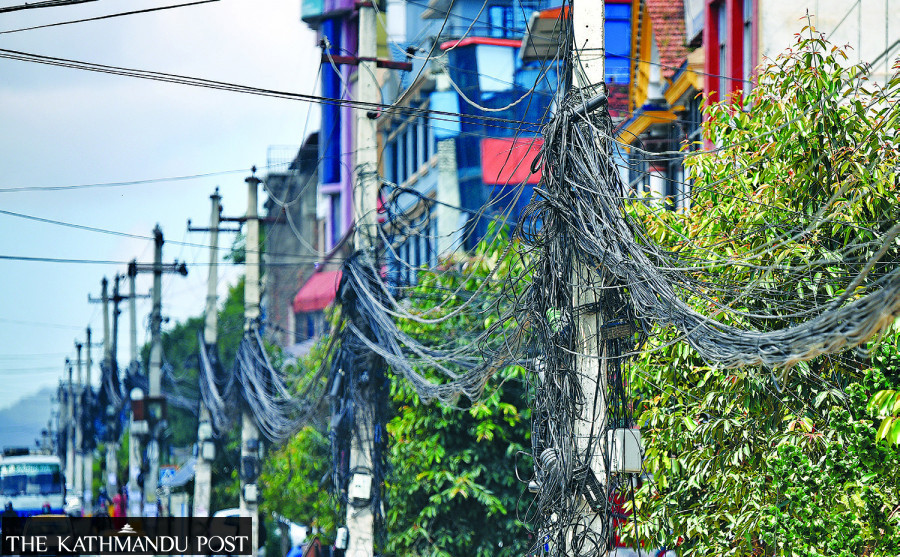Money
Panel recommends adjusting rental fee for electricity poles
Cable TV operators and internet service providers have been arguing with the power utility over the rent for a long time.
Krishana Prasain
A government committee has recommended adjusting the rental rates for utility poles following a dispute between the owner Nepal Electricity Authority and cable companies who stopped paying the fee arguing it was too high.
The Communication Ministry formed the panel consisting of representatives from the Nepal Telecommunications Authority, Nepal Electricity Authority, Nepal Telecom and Law Ministry to finalise the rental fee for the use of the electricity poles besides the management of the wires on them after the utility began cutting them for non-payment of the rent.
The panel said that the current fee demanded by the Nepal Electricity Authority was too high, and that it should be corrected on a scientific basis. The state-owned power utility has set the annual rental fee at Rs14,000 per kilometre.
Cable TV operators and internet service providers have been arguing with the power utility over the rent for a long time.
"The study report submitted to the Communication Ministry by the committee on Friday states that the rental fee for the electricity poles from 2018 to 2020 was exorbitant and needed to be reviewed," said Binod Prakash Singh, spokesperson for the ministry.
A copy of the study report has been submitted to the Ministry of Energy too.
Suresh Bahadur Bhattarai, spokesperson for the Nepal Electricity Authority, said they were waiting for the decision and would implement it.
Earlier, the rental fee for the use of electricity poles had been revised by the government.
"The report has also suggested that the rental fee should be fixed separately for cable TV operators and internet service providers," said Singh.
He added that a coordination committee needed to be set up to settle possible disputes over rental fees and other matters in the future.
The study report has also recommended infrastructure sharing as installing separate equipment by each service provider would be costly and repetitive.
The row between the Nepal Electricity Authority and service providers over the rental fee came to a head after the utility on September 14 issued a public notice warning them to clear up outstanding rent payments or their wires would be removed from October 1.
The power utility warned the internet, telephone and cable companies using its utility poles to string wires that they would have to face the consequences if they did not pay the rent for the poles by October 1.
The power utility said that some internet service providers, phone companies and cable TV operators had been using its infrastructure without permission while others had not submitted documents providing details of the global positioning system (GPS) coordinates and map and distance.
The utility has also told services providers not to install new wires without first signing an agreement with it.
In response, internet service providers said the electricity authority increased the rental rates by more than four times within a year in 2018. "We said we would not pay the increased charges and there is no condition to pay more," they said.
"The Ministry of Communication and Information Technology has made a policy to provide internet access to all at reasonable prices, but raising the rent for electricity poles could increase the price of internet connections," internet service providers said.
The state-owned power utility, in a dispute over unpaid fees by internet service providers
On October 2, the Nepal Electricity Authority cut the internet and cable wires in nearly a dozen places across the country, saying that internet service providers had been using its electricity poles but failed to pay the rental charge.
As per the new rent fee structure, service providers need to pay Rs14,000 excluding tax per kilometre annually for using 33 and 11 kV poles.
To install optical fibre on an electricity distribution line of 33 or 11 kV or lower, service providers have to pay Rs9,000 and Rs7,000 per km annually in metropolitan cities and municipality/rural municipalities, respectively.
Publishing a notice on October 27, the Nepal Telecommunications Authority asked service providers to self-declare the location, number and type of the infrastructure and the duration of use, particularly the poles they have been using, and sign a formal contract by mid-November.




 11.42°C Kathmandu
11.42°C Kathmandu













